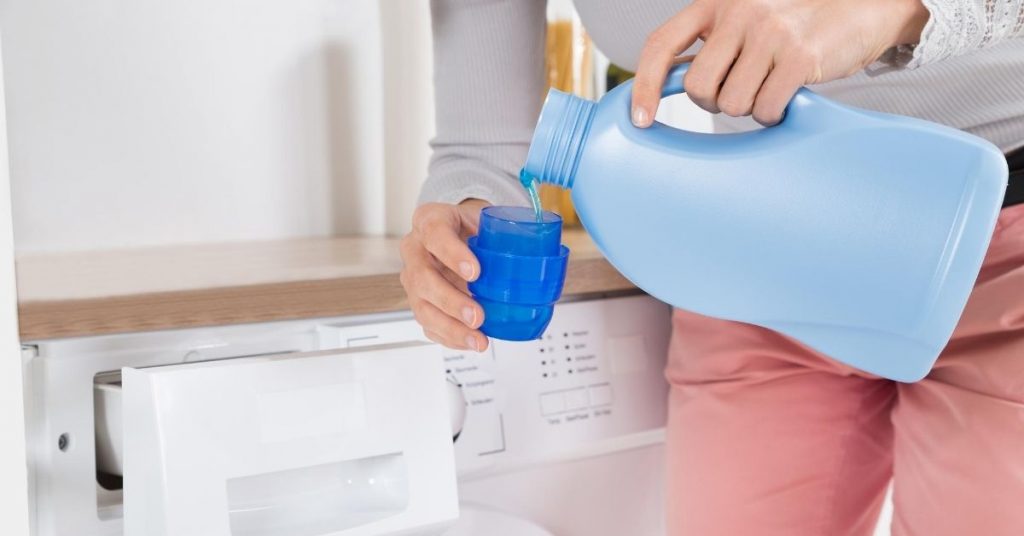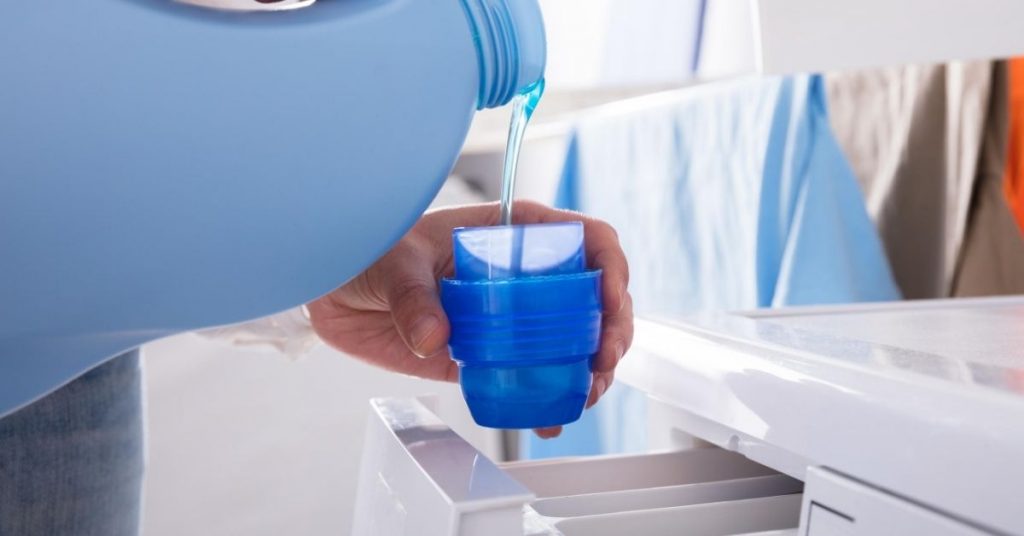What’s the Difference Between Bio and Non-Bio?
Have you ever found yourself in the laundry aisle staring at an overwhelming range of products wondering what the difference actually is between bio and non-bio?
Maybe you’re clued up on what each one is but are looking for a little more clarity on when and how to use each one.
Either way, this post will give you all the answers to every bio vs. non-bio question you can possibly think of.
Some of us can get away with just throwing whatever’s around (or cheapest) into the washing machine with our clothes and they’ll come out clean and smelling lovely.
If this is you, we can probably assume you don’t struggle with sensitive skin or eczema and aren’t washing clothes for a baby.
Knowing when to use each laundry detergent comes down to the needs of the person and the level of cleaning required.
To understand this better, let’s first find out what bio and non-bio mean by definition.
| Related: – Best Smelling Laundry Detergent UK: Ultimate Buyers Guide – The Best Natural Washing Powder In The UK |
What Does Bio Mean in Laundry Products?
Biological detergent contains enzymes which use a lock and key method to achieve a deep clean and break down dirt or stains.
Enzymes are the ideal force to break down hard-wearing dirt, grease and oils in fabric.
The thing about enzymes is they need a particular catalyst to set off the reaction process.
In the case of laundry, this could be the wash reaching a certain temperature or the effect of other ingredients in a product that produce the necessary level of alkalinity.
Watch this video for an in-depth look at different enzymes and how they break down stains.
What Does “Non-Bio” Mean in Laundry Products?
Non-Biological detergent contains no enzymes and tends to be better for people with sensitive skin.
In safe non-biological products designed for sensitive skin, the cleaning chemicals are softer but still work well to clean clothes and fabric.
However, in some brands, the cleaning chemicals may be harsher and might rely on hot water as well as chemicals to get the grease and grime off the fabric.
| Clean and Tidy Living Top Tip: Remember to check the ingredients in a non-bio formula as the detergents may contain irritants like strong bleaches to give a powerful clean. |
How to Use Non-Biological & Biological Detergents
Luckily there’s no real difference in how and when to use biological and non-biological laundry detergents and powders.
Both products can be added to laundry in the same way before starting a cycle.
The only difference may be that biological detergents can work at a lower temperature.
If you’re using a pre-wash treatment like a stain remover, then apply this before a wash in the same way for biological and non-biological.

How to Know When to Use Biological or Non-Biological
So hopefully that’s cleared up the difference between biological and non-biological washing powders and how to use them. But now you may be wondering when to use each one.
Don’t worry, we’ve got you covered.
When should you use biological washing powder?
Biological detergents are the best at breaking down tough stains from dirt and oil.
The enzymes present in biological detergent allow for washing at lower temperatures and with less water whilst still achieving a really deep down clean.

When Should You Use Non-Bio Washing Powder?
If you’re washing clothes and fabrics that will be in contact with a young baby or somebody with sensitive skin due to an allergy or eczema, then a non-bio laundry detergent that uses a gentle perfume is probably the best option.
Advantages and Disadvantages of Bio vs. Non-Bio Detergents
Stain Removal
The key difference between biological and non-biological laundry products is that bio detergents contain enzymes which are the best at breaking down dirt and stains to make them easy to remove.
Environmental
Enzymes can clean effectively at lower temperatures (30-50°C) and on quicker cycles due to the lock and key process. If you’re looking to save water and energy with a more eco-friendly option then bio detergents may be the best option.
However, the enzymes in bio laundry products can take a while to break down in the environment.
If you’re looking for an eco-friendly non-bio laundry detergent we recommend Ecozone Non-bio Laundry Capsules which can be used at 30 degrees.
If you’re bulk buying, the Faith in Nature Super Concentrated Laundry Liquid is a 5-litre refillable bottle that contains no enzymes, parabens, phosphates or Bleaches.
Sensitive Skin
If people have or are washing for people with sensitive skin then non-biological detergents are preferred. Non-Bio washing products have no enzymes so there’s a reduced risk of causing skin irritation, as long as the alternative cleaning chemicals are safe for sensitive skin.
Colour Fading
The enzymes and potential bleach in biological detergents can cause fading of bright coloured clothing and fabrics.
Non-biological products are gentler on colours so will keep your clothes looking brighter for longer.

Washing Powder FAQ’s
Is Non-Bio Better for Colours?
Yes. The enzymes and bleach in biological detergents cause colour fading faster. Some non-biological detergents still contain bleach so there may still be fading, but not as fast as an enzyme cleaner.
Why Do Babies Use Non-Bio?
Enzymes and harsh chemicals in biological cleaners can irritate babies sensitive and delicate skin.
We recommend the Persil Non Bio Washing Detergent which is designed for babies sensitive skins and approved by the British Skin Foundation.
Is Biological Washing Powder Bad for Skin?
Bio washing powder is fine to use for most people. If you have and are washing for a family with normal (non-sensitive) skin, with no babies, then biological is fine and may even be more effective.
Which Is Better for the Environment Bio or Non-Bio?
There are arguments for both as bio works best on shorter, cooler cycles which save water and energy. However, biological enzymes leave traces in the environment for longer than a non-bio detergent.
For an environmentally friendly solution, we recommend Ecozone Non-bio Laundry Capsules or Faith in Nature Super Concentrated Laundry Liquid.
Does Bio Detergent Kill Bacteria?
It’s unlikely that the bacteria in our machines and clothes will cause any physical damage, but to be extra cautious a 60-degree wash can make detergents more effective at tackling bacteria.
Washing any hotter than 60 degrees can stop the enzyme process from breaking down fats and oils.
Does Bio Washing Powder Contain Bleach?
It’s impossible to speak for all biological detergents, but most will contain a combination of enzymes and bleach to provide the best possible clean.
If you’re looking for a bleach-free cleaner then this Faith in Nature Super Concentrated Laundry Liquid is an ideal solution with great reviews.
Does Bio Washing Powder Fade Clothes?
Unfortunately, the powerful cleaning abilities of enzymes can have an adverse effect on the colour of our clothes.
Dyes running out of fabric is sometimes unavoidable, but these things may make a slight difference to maintaining colour:
- Washing on a cooler 30-40 degrees cycle
- Wash inside out
- When hanging clothes to dry, hang inside out to stop sun-bleach
- Iron inside out
- Splitting washes into lights, darks and colours
- Use a colour protect detergent – Persil Colour Washing Liquid
What Detergent Is Best for Color Clothes?
Non-biological detergent is the best option out of bio vs non-bio for preventing colour fade.
If you don’t want to lose the cleaning power of a biological detergent then how about trying a new laundry product designed to keep colours bright for longer.
Here are our current Clean & Tidy Living favourites:
- Persil Colour Washing Liquid
- Persil Washing Detergent Colour Capsules and Comfort Intense Fuchsia Passion Fabric Conditioner
- Ecover Delicate Laundry Liquid Refill, 110 Washes
Our Final Thoughts on Bio Vs. Non-Bio
We hope we’ve helped shed light on the Difference Between Bio and Non-Bio, and provided some helpful information.
There are advantages and disadvantages for both types of detergent, so it comes down to the needs of your household.
Ultimately, if your current method and products are working for you then there’s no reason to change it.
If you have any real concerns about irritation then speak to a skincare specialist and look carefully at the chemicals inside your laundry detergent and make sure there’s nothing scary.
Related Cleaning Articles:
- Best Smelling Laundry Detergent UK: Ultimate Buyers Guide
- How To Get Mud Out Of Clothes
- What Are Delicates In Laundry: The Expert Guide
- The Best Natural Washing Powder In The UK
- Best Washing Machine Under £300 In The UK Right Now
- What Is A Cleaning Schedule And How To Make One
- My House Is Messy, Where Do I Start?
- What To Do When You Can’t Keep On Top Of Housework

